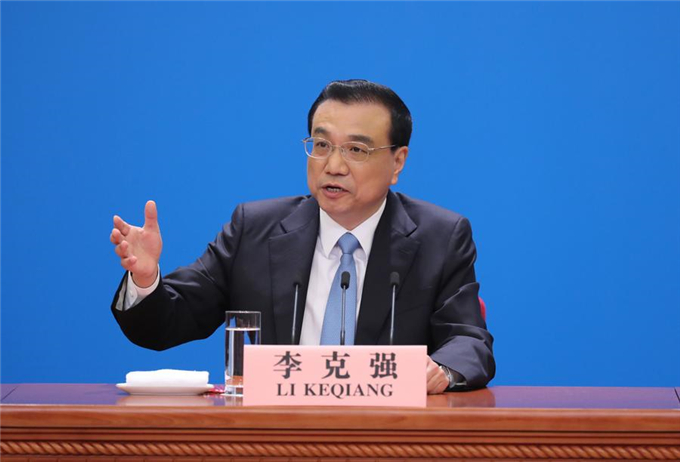Highlights of Premier Li's news conference

Premier Li Keqiang answers questions of reporters at a news conference for the first session of the 13th National People's Congress in Beijing on March 20, 2018. [Photo/Xinhua]
Premier Li Keqiang meets reporters from home and abroad at a news conference on March 20 at the end of the annual meeting of the National People's Congress. Here are highlights of the event.
China will continue opening up
China will open even wider to imports and investment, fully opening the manufacturing sector to foreign competitors and cutting tariffs on more imports, Chinese Premier Li Keqiang said Tuesday.
Li said at a news conference right after the closing meeting of the annual session of the 13th National People's Congress that the Chinese economy is so integrated into the global economy and closing the doors would only block China's own way.
"If there is something that will be different from the past, it will be that China will open even wider," Li said.
China will lift the foreign-owned equity limit in some areas and the country will fully open up the manufacturing sector.
"There will be no mandatory requirement for technology transfer, and intellectual property rights will be better protected,” Li stressed.
The premier also said the country plans to eliminate import tariffs on drugs and reduce tariffs on other imported goods.
Optimizing business environment
China will continue to streamline administrations and deligate power to improve business environment and further stimulate market vitality, Premier Li Keqiang said Tuesday.
"We will cut the time it takes for opening a business in China by another half and we will reduce the time required for reviewing a project application by another half," Li said at a press conference after the conclusion of the annual legislative session.
Measures will also be taken to have an e-platform in a national level for accessing government services online and ensure any requirement for certification that has no basis in laws and regulations will be abolished, he said.
Li said thanks to efforts in recent years, China has significantly cut the time for opening a business, but it still takes 22 days on average to do so in the country. By comparison, it takes less than a day in a developed country.
"We must further cut the red tape and simplify administrative procedures," he said.
China welcomes cooling tensions on Korean Peninsula
China welcomes the recent de-escalation of tensions on the Korean peninsula, and China supports all efforts that will help resolve the nuclear issue through dialogue and consultation, Premier Li Keqiang said.
Li made the remarks when asked about Beijing’s expectations for the peninsula situation at a press conference held at the end of the annual meeting of the National People's Congress in Beijing on Tuesday.
China will continue to do its best to push for the peninsula's denuclearization and secure peace and stability there, Li said.
It is hoped all parties involved will show sincerity, take concrete actions, and get the nuclear issue back on track for negotiations, so more new progress will be made towards the peninsula's denuclearization, peace and stability, Li said.
This is in the interest of all parties concerned and of the whole world, he added.
The peninsula is China's close neighbor and happenings there directly concern China's interests, so it should be expected China has been paying attention to the situation, Li said.
China committed to property rights
China will pay great attention to protecting property rights of all business entities, whether State-owned enterprises or private businesses, Premier Li Keqiang said Tuesday.
"Businesses of all types of ownership, be it State-owned or private enterprises, have made important contributions to China's tremendous economic growth in the past decades," Li said at a news conference after the closing meeting of the annual session of the 13th National People's Congress.
Private business has contributed to nearly half of government tax, and 90 percent of new urban employment, Li noted.
Li said the country will make all property owners, including investors and companies with all types of ownership, feel confident by reassuring their legitimate property rights.
"Property rights are the cornerstone of the socialist market economy. Protecting property rights is protecting productive forces," Li said.
He added contracts must be honored and no legitimate contract should be treated as a piece of scrap paper.
China will not seek expansion
China will not seek expansion, as it is a developing country with no expansionary intentions - even if it grows stronger in the future, Chinese Premier Li Keqiang said Tuesday.
The nation will not follow older logic that a strong country is bound to seek hegemony, he added.
China has achieved peaceful development, and a peaceful international environment is still what China needs to achieve full modernization.
In recent years, China's economic growth has contributed around 30 percent to global growth, which is important for global economic recovery and good for upholding global peace, because with more trade there's going to be more negotiations that help to keep conflict away, Li explained.
"One must not do to others what one himself does not like," he said.
China pursues peaceful development, though the nation is most resolute in upholding its own territorial integrity and will not abandon a single inch of its own land, Li said. And in the same way, China will not occupy an inch of the land of others, he added.
"China will continue to focus its energy on managing China's own affairs well."
China wants to develop relations with all other countries and regions on the basis of mutual respect and equal, mutual benefit. "We will together to build a community of shared future together."